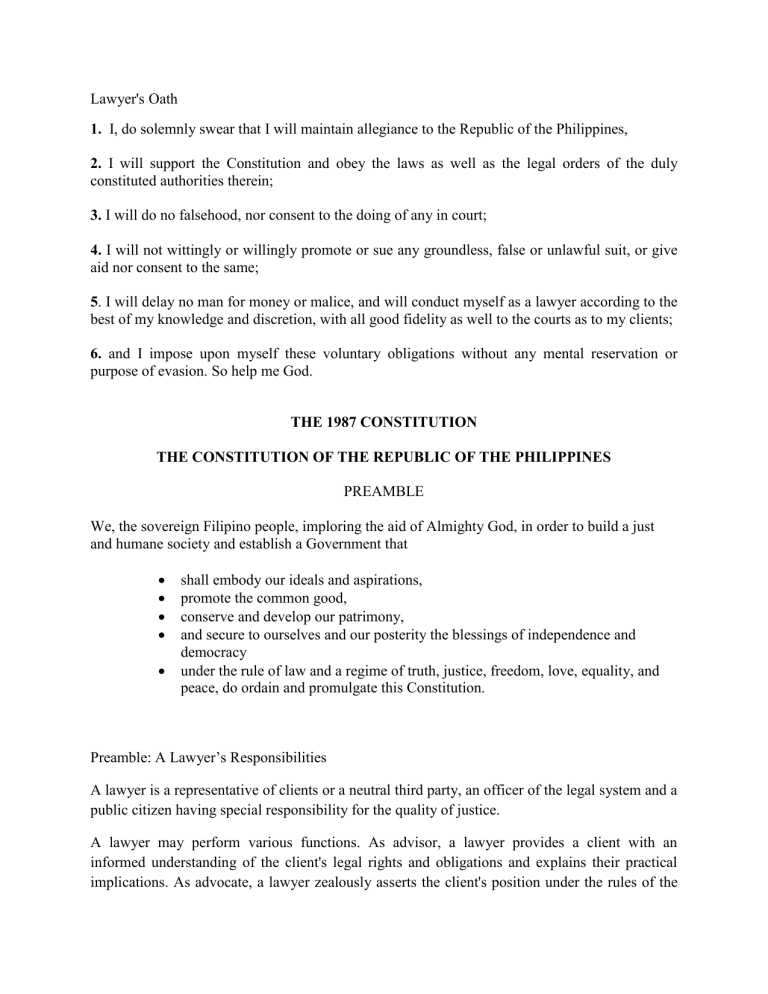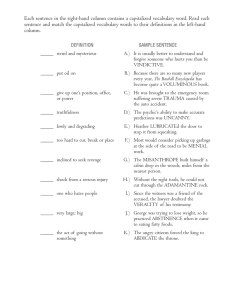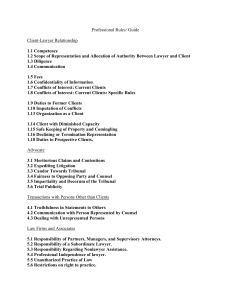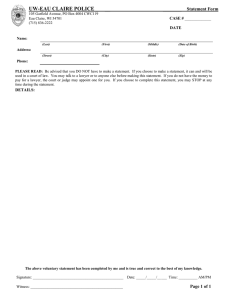
Lawyer's Oath 1. I, do solemnly swear that I will maintain allegiance to the Republic of the Philippines, 2. I will support the Constitution and obey the laws as well as the legal orders of the duly constituted authorities therein; 3. I will do no falsehood, nor consent to the doing of any in court; 4. I will not wittingly or willingly promote or sue any groundless, false or unlawful suit, or give aid nor consent to the same; 5. I will delay no man for money or malice, and will conduct myself as a lawyer according to the best of my knowledge and discretion, with all good fidelity as well to the courts as to my clients; 6. and I impose upon myself these voluntary obligations without any mental reservation or purpose of evasion. So help me God. THE 1987 CONSTITUTION THE CONSTITUTION OF THE REPUBLIC OF THE PHILIPPINES PREAMBLE We, the sovereign Filipino people, imploring the aid of Almighty God, in order to build a just and humane society and establish a Government that shall embody our ideals and aspirations, promote the common good, conserve and develop our patrimony, and secure to ourselves and our posterity the blessings of independence and democracy under the rule of law and a regime of truth, justice, freedom, love, equality, and peace, do ordain and promulgate this Constitution. Preamble: A Lawyer’s Responsibilities A lawyer is a representative of clients or a neutral third party, an officer of the legal system and a public citizen having special responsibility for the quality of justice. A lawyer may perform various functions. As advisor, a lawyer provides a client with an informed understanding of the client's legal rights and obligations and explains their practical implications. As advocate, a lawyer zealously asserts the client's position under the rules of the adversary system. As negotiator, a lawyer seeks a result advantageous to the client but consistent with requirements of honest dealing with others. As intermediary between clients, a lawyer seeks to reconcile their divergent interests as an advisor and, to a limited extent, as a spokesperson for each client. As third party neutral, a lawyer represents neither party, but helps the parties arrive at their own solution. As evaluator, a lawyer examines a client's legal affairs and reports about them to the client or to others. In all professional functions a lawyer should be competent, prompt and diligent. A lawyer should maintain communication with a client concerning the representation. A lawyer should keep in confidence information relating to representation of a client except so far as disclosure is required or permitted by the Rules of Professional Conduct or other law. A lawyer's conduct should conform to the requirements of the law, both in professional service to clients and in the lawyer's business and personal affairs. A lawyer should use the law's procedures only for legitimate purposes and not to harass or intimidate others. A lawyer should demonstrate respect for the legal system and for those who serve it, including judges, other lawyers and public officials. While it is a lawyer's duty, when necessary, to challenge the rectitude of official action, it is also a lawyer's duty to uphold legal process. As a public citizen, a lawyer should seek improvement of the law, the administration of justice and the quality of service rendered by the legal profession. As a member of a learned profession, a lawyer should cultivate knowledge of the law beyond its use for clients, employ that knowledge in reform of the law and work to strengthen legal education. A lawyer should be mindful of deficiencies in the administration of justice and of the fact that the poor, and sometimes persons who are not poor, cannot afford adequate legal assistance, and should therefore devote professional time and civic influence in their behalf. A lawyer should aid the legal profession in pursuing these objectives and should help the bar regulate itself in the public interest. Many of a lawyer's professional responsibilities are prescribed in the Rules of Professional Conduct, as well as substantive and procedural law. However, a lawyer is also guided by personal conscience and the approbation of professional peers. A lawyer should strive to attain the highest level of skill, to improve the law and the legal profession, and to exemplify the legal profession's ideals of public service. A lawyer's responsibilities as a representative of clients, an officer of the legal system and a public citizen are usually harmonious. Thus, when an opposing party is well represented, a lawyer can be a zealous advocate on behalf of a client and at the same time assume that justice is being done. So also, a lawyer can be sure that preserving client confidences ordinarily serves the public interest because people are more likely to seek legal advice, and thereby heed their legal obligations, when they know their communications will be private. In the nature of law practice, however, conflicting responsibilities are encountered. Virtually all difficult ethical problems arise from conflict between a lawyer's responsibilities to clients, to the legal system and to the lawyer's own interest in remaining an upright person while earning a satisfactory living. The Rules of Professional Conduct prescribe terms for resolving such conflicts. Within the framework of these Rules, many difficult issues of professional discretion can arise. Such issues must be resolved through the exercise of sensitive professional and moral judgment guided by the basic principles underlying the Rules. The legal profession is largely self-governing. Although other professions also have been granted powers of self-government, the legal profession is unique in this respect because of the close relationship between the profession and the processes of government and law enforcement. This connection is manifested in the fact that ultimate authority over the legal profession is vested largely in the courts. To the extent that lawyers meet the obligations of their professional calling, the occasion for government regulation is obviated. Self-regulation also helps maintain the legal profession's independence from government domination. An independent legal profession is an important force in preserving government under law, for abuse of legal authority is more readily challenged by a profession whose members are not dependent on government for the right to practice. The legal profession's relative autonomy carries with it special responsibilities of selfgovernment. The profession has a responsibility to assure that its regulations are conceived in the public interest and not in furtherance of parochial or self-interested concerns of the bar. Every lawyer is responsible for observance of the Rules of Professional Conduct. A lawyer should also aid in securing their observance by other lawyers. Neglect of these responsibilities compromises the independence of the profession and the public interest which it serves. Lawyers play a vital role in the preservation of society. The fulfillment of this role requires an understanding by lawyers of their relationship to our legal system. The Rules of Professional Conduct, when properly applied, serve to define that relationship. Scope The Rules of Professional Conduct are rules of reason. They should be interpreted with reference to the purposes of legal representation and of the law itself. Some of the Rules are imperatives, cast in the terms "shall" or "shall not." These define proper conduct for purposes of professional discipline. Others, generally cast in the term "may," are permissive and define areas under the Rules in which the lawyer has professional discretion. No disciplinary action should be taken when the lawyer chooses not to act or acts within the bounds of such discretion. Other Rules define the nature of relationships between the lawyer and others. The Rules are thus partly obligatory and disciplinary and partly constitutive and descriptive in that they define a lawyer's professional role. Many of the Comments use the term "should." Comments do not add obligations to the Rules but provide guidance for practicing in compliance with the Rules. These Rules follow the same format as the current American Bar Association Model Rules of Professional Conduct ("ABA Model Rules"), rather than the former American Bar Association Model Code of Professional Responsibility ("ABA Model Code"), or the former Virginia Code of Professional Responsibility ("Virginia Code"). Although interpretation of similar language in the ABA Model Rules by other states' courts and bars might be helpful in understanding Virginia's Rules, those foreign interpretations should not be binding in Virginia. The Rules presuppose a larger legal context shaping the lawyer's role. That context includes court rules and statutes relating to matters of licensure, laws defining specific obligations of lawyers and substantive and procedural law in general. Compliance with the Rules, as with all law in an open society, depends primarily upon understanding and voluntary compliance, secondarily upon reinforcement by peer and public opinion and finally, when necessary, upon enforcement through disciplinary proceedings. The Rules do not, however, exhaust the moral and ethical considerations that should inform a lawyer, for no worthwhile human activity can be completely defined by legal rules. The Rules simply provide a framework for the ethical practice of law. Furthermore, for purposes of determining the lawyer's authority and responsibility, principles of substantive law external to these Rules determine whether a client-lawyer relationship exists. Most of the duties flowing from the client-lawyer relationship attach only after the client has requested the lawyer to render legal services and the lawyer has agreed to do so. But there are some duties, such as that of confidentiality under Rule 1.6, that may attach when the lawyer agrees to consider whether a client-lawyer relationship shall be established. Whether a clientlawyer relationship exists for any specific purpose can depend on the circumstances and may be a question of fact. These Rules apply to all lawyers, whether practicing in the private or the public sector. However, under various legal provisions, including constitutional, statutory and common law, the responsibilities of government lawyers may include authority concerning legal matters that ordinarily reposes in the client in private client-lawyer relationships. For example, a lawyer for a government agency may have authority on behalf of the government to decide upon settlement or whether to appeal from an adverse judgment. Such authority in various respects is generally vested in the Attorney General and the commonwealth attorneys in state government, and their federal counterparts, and the same may be true of other government law officers. Also, lawyers under the supervision of these officers may be authorized to represent several government agencies in intragovernmental legal controversies in circumstances where a private lawyer could not represent multiple private clients. They also may have authority to represent the "public interest" in circumstances where a private lawyer would not be authorized to do so. These Rules do not abrogate any such authority. Failure to comply with an obligation or prohibition imposed by a Rule is a basis for invoking the disciplinary process. The Rules presuppose that disciplinary assessment of a lawyer's conduct will be made on the basis of the facts and circumstances as they existed at the time of the conduct in question and in recognition of the fact that a lawyer often has to act upon uncertain or incomplete evidence of the situation. Moreover, the Rules presuppose that whether or not discipline should be imposed for a violation, and the severity of a sanction, depend on all the circumstances, such as the willfulness and seriousness of the violation, extenuating factors and whether there have been previous violations. Violation of a Rule should not give rise to a cause of action nor should it create any presumption that a legal duty has been breached. The Rules are designed to provide guidance to lawyers and to provide a structure for regulating conduct through disciplinary agencies. They are not designed to be a basis for civil liability. Furthermore, the purpose of the Rules can be subverted when they are invoked by opposing parties as procedural weapons. The fact that a Rule is a just basis for a lawyer's self-assessment, or for sanctioning a lawyer under the administration of a disciplinary authority, does not imply that an antagonist in a collateral proceeding or transaction has standing to seek enforcement of the Rule. Accordingly, nothing in the Rules should be deemed to augment any substantive legal duty of lawyers or the extra-disciplinary consequences of violating such a duty. Moreover, these Rules are not intended to govern or affect judicial application of either the attorney-client or work product privilege. Those privileges were developed to promote compliance with law and fairness in litigation. In reliance on the attorney-client privilege, clients are entitled to expect that communications within the scope of the privilege will be protected against compelled disclosure. The attorney-client privilege is that of the client and not of the lawyer. The fact that in exceptional situations the lawyer under the Rules has either a limited discretion or a limited obligation to disclose a client confidence does not vitiate the proposition that, as a general matter, the client has a reasonable expectation that information relating to the client will not be voluntarily disclosed and that disclosure of such information may be judicially compelled only in accordance with recognized exceptions to the attorney-client and work product privileges. The lawyer's exercise of discretion not to disclose information under Rule 1.6 should not be subject to reexamination. Permitting such reexamination would be incompatible with the general policy of promoting compliance with law through assurances that communications will be protected against disclosure. The Preamble and this note on Scope provide general orientation. The text of each Rule and the following Terminology section are authoritative and the Comments accompanying each Rule are interpretive. Terminology "Belief" or "believes" denotes that the person involved actually supposed the fact in question to be true. A person's belief may be inferred from circumstances. "Consult" or "consultation" denotes communication of information reasonably sufficient to permit the client to appreciate the significance of the matter in question. "Firm" or "law firm" denotes a professional entity, public or private, organized to deliver legal services, or a legal department of a corporation or other organization. See Comment, Rule 1.10. "Fraud" or "fraudulent" denotes conduct having a purpose to deceive and not merely negligent misrepresentation or failure to apprise another of relevant information. "Knowingly," "known," or "knows" denotes actual knowledge of the fact in question. A person's knowledge may be inferred from circumstances. “Partner” denotes a member of a partnership or a shareholder or member of a professional entity, public or private, organized to deliver legal services, or a legal department of a corporation or other organization. "Reasonable" or "reasonably" when used in relation to conduct by a lawyer denotes the conduct of a reasonably prudent and competent lawyer. "Reasonable belief" or "reasonably believes" when used in reference to a lawyer denotes that the lawyer believes the matter in question and that the circumstances are such that the belief is reasonable. "Reasonably should know" when used in reference to a lawyer denotes that a lawyer of reasonable prudence and competence would ascertain the matter in question. "Should" when used in reference to a lawyer's action denotes an aspirational rather than a mandatory standard. "Substantial" when used in reference to degree or extent denotes a material matter of clear and weighty importance.






